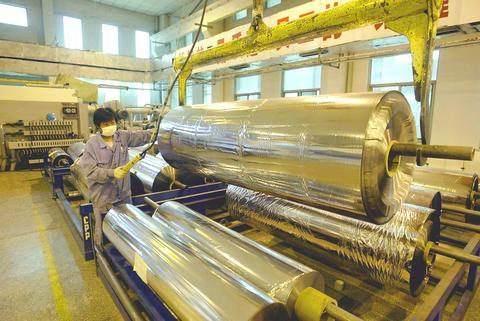Inflationary pressures are rapidly increasing in China's fast-growing economy, with new data from China's central bank, the People's Bank of China, showing that companies paid fast-rising prices last month to buy a wide range of commodities and industrial products.
Inflation in China has become a growing concern to bankers, corporate executives and monetary officials around the world.
The Chinese economy, as a producer, and the US economy, as a consumer, have emerged as the two main engines of the global economy, but China's ability to sustain its breakneck pace of economic growth is increasingly in doubt, said Sung Sohn, an executive vice president of Wells Fargo.

PHOTO: EPA
"There's a greater probability the Chinese engine might stall, and that represents the greatest threat to the global economy," Sohn said during a visit to Hong Kong on Thursday.
The corporate goods price index of the People's Bank of China jumped 8.3 percent last month compared with March last year.
The index measures prices that companies pay for goods from other companies, and covers transactions at many levels of the economy, from the iron ore that mines sell to steel mills to the washing machines that appliance manufacturers sell to distributors and retailers.
The rise last month represents a swift acceleration in an important measure of inflation. The year-over-year change was less than 1 percent as recently as June, and the index was actually falling in 2002. The big mystery now, economists said, is when and whether the latest rapid increases will show up in the prices that consumers pay at their nearest vegetable market or hardware store.
According to the National Bureau of Statistics, the consumer price index was only up 2.1 percent in February, compared with a year earlier.
Its producer price index of industrial products, which measures what producers of finished goods charge to distributors and retailers, was up 3.5 percent.
The bureau is periodically accused by Western and Chinese experts of adjusting statistics for political reasons, something the agency's officials strongly deny. The widening discrepancy between the bureau's figures and the less well-known but more alarming data from the central bank is nonetheless starting to attract attention among economists.
Asked about why some data shows inflation in China at 3 percent or so, an official at the People's Bank said the bank was absolutely convinced that its figures were accurate.
"Don't believe other people's figures," he added.

MAKING WAVES: China’s maritime militia could become a nontraditional threat in war, clogging up shipping lanes to prevent US or Japanese intervention, a report said About 1,900 Chinese ships flying flags of convenience and fishing vessels that participated in China’s military exercises around Taiwan last month and in January last year have been listed for monitoring, Coast Guard Administration (CGA) Deputy Director-General Hsieh Ching-chin (謝慶欽) said yesterday. Following amendments to the Commercial Port Act (商港法) and the Law of Ships (船舶法) last month, the CGA can designate possible berthing areas or deny ports of call for vessels suspected of loitering around areas where undersea cables can be accessed, Oceans Affairs Council Minister Kuan Bi-ling (管碧玲) said. The list of suspected ships, originally 300, had risen to about

DAREDEVIL: Honnold said it had always been a dream of his to climb Taipei 101, while a Netflix producer said the skyscraper was ‘a real icon of this country’ US climber Alex Honnold yesterday took on Taiwan’s tallest building, becoming the first person to scale Taipei 101 without a rope, harness or safety net. Hundreds of spectators gathered at the base of the 101-story skyscraper to watch Honnold, 40, embark on his daredevil feat, which was also broadcast live on Netflix. Dressed in a red T-shirt and yellow custom-made climbing shoes, Honnold swiftly moved up the southeast face of the glass and steel building. At one point, he stepped onto a platform midway up to wave down at fans and onlookers who were taking photos. People watching from inside

Japan’s strategic alliance with the US would collapse if Tokyo were to turn away from a conflict in Taiwan, Japanese Prime Minister Sanae Takaichi said yesterday, but distanced herself from previous comments that suggested a possible military response in such an event. Takaichi expressed her latest views on a nationally broadcast TV program late on Monday, where an opposition party leader criticized her for igniting tensions with China with the earlier remarks. Ties between Japan and China have sunk to the worst level in years after Takaichi said in November that a hypothetical Chinese attack on Taiwan could bring about a Japanese

The WHO ignored early COVID-19 warnings from Taiwan, US Deputy Secretary of Health and Human Services Jim O’Neill said on Friday, as part of justification for Washington withdrawing from the global health body. US Secretary of State Marco Rubio on Thursday said that the US was pulling out of the UN agency, as it failed to fulfill its responsibilities during the COVID-19 pandemic. The WHO “ignored early COVID warnings from Taiwan in 2019 by pretending Taiwan did not exist, O’Neill wrote on X on Friday, Taiwan time. “It ignored rigorous science and promoted lockdowns.” The US will “continue international coordination on infectious